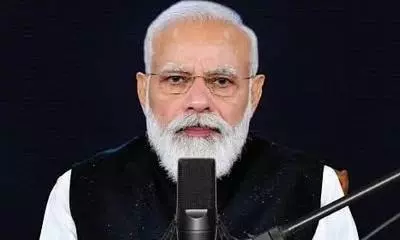
Mann Ki Baat: PM Modi hails Odisha couple's Goat Bank initiative

New Delhi, Feb 25 (PTI) Prime Minister Narendra Modi on Sunday lauded a "Goat Bank" initiative of an Odisha couple which promotes goat rearing at the community level and helps the villagers move towards self-reliance in the field of animal husbandry.
In his Mann Ki Baat radio broadcast, Modi said when people talk about animal husbandry, they often stop at cows and buffaloes only. But the goat is also an important animal, which is not discussed much, he said.
He pointed out that many people in different areas of the country are associated with goat rearing.
In Kalahandi, Odisha, goat rearing is becoming a major means of improving the livelihood of the village people as well as their standard of living, the prime minister said.
"Behind this effort is a major decision of Jayanti Mahapatra ji and her husband Biren Sahu ji. Both of them were management professionals in Bengaluru. But they decided to take a break and come to Salebhata village of Kalahandi," he said.
These people wanted to do something that would solve the problems of the villagers here and simultaneously empower them, he said.
"With this thinking full of service and dedication, they established Manikastu Agro and started working with the farmers. Jayanti ji and Biren ji have also opened an interesting Manikastu Goat Bank here. They are promoting goat rearing at the community level. There are about dozens of goats at their goat farm," he said.
Noting that Manikastu Goat Bank has set up a complete system for the farmers, Modi said through this, farmers are given two goats for 24 months.
"Goats give birth to nine to 10 kids in two years, out of which six kids are kept by the bank. The rest are given to the same family which rears goats. Not only that, necessary services are also provided for the care of goats," he said.
Today more than 1,000 farmers from 50 villages are associated with this couple, the prime minister said, and added that with their help, the village people are moving towards self-reliance in the field of animal husbandry.
"I feel very happy to see that successful professionals in various fields are adopting novel methods to make small farmers empowered and self-reliant. Their efforts are going to inspire everyone," the prime minister said.
"The essence of the teachings of our culture is 'Parmarth Paramo Dharmah', that is, helping others is the highest duty. Following this sentiment, countless people in our country dedicate their lives to serving others selflessly," Modi said.
He cited the example of Bhim Singh Bhavesh of Bhojpur in Bihar, saying there is a lot of buzz about his work among the people of the Musahar caste of his region.
"Musahar has been a very deprived community in Bihar. It is a very poor community. Bhim Singh Bhavesh ji has focused on the education of the children of this community so that their future could be bright.
"He has enrolled about 8,000 children of Musahar caste in school. He has also built a big library, through which children are getting better facilities for education," Modi said.
Bhim Singh also helps his community members in making necessary documents and filling up their forms, he elaborated, and said this has further improved the village people's access to essential resources.
"To improve the health of the people, he has organised more than 100 medical camps. When the terrible Coronavirus crisis was looming large, Bhim Singh ji encouraged the people in his area to get vaccinated," the prime minister said.
In his broadcast, Modi also talked about people who are working in the field of language.
He cited the example of Mohammad Manshah of Ganderbal in Jammu and Kashmir who is engaged in efforts to preserve the Gojri language for the last three decades.
"He comes from the Gujjar Bakarwal community which is a tribal community. In his childhood he had to work hard to study.
"He used to cover a distance of 20 kilometers on foot every day. Amidst such challenges, he obtained a masters degree and it was only then that his resolve to preserve his language became stronger," Modi said.
The scope of Manshah's work in the field of literature is so extensive that it has been conserved in about 50 volumes, the prime minister said.
"These also include poems and folk songs. He has translated many books into the Gojri language," he said.
Modi also gave the example of Banwang Losu of Tirap in Arunachal Pradesh who is a teacher. He has made an important contribution in the spread of Wancho language, Modi noted.
"This language is spoken in Arunachal Pradesh, Nagaland and some parts of Assam. He has undertaken the task of setting up a language school.
"A script of the Wancho language has also been prepared. He is also teaching the Wancho language to the coming generations so that it can be saved from extinction," Modi said, lauding Losu's work.
"There are many people in our country who are engaged in preserving their culture and language through songs and dances. The life of Venkappa Ambaji Sugetkar of Karnataka is also very inspiring in this regard.
"Sugatkar ji, resident of Bagalkot here, is a folk singer. He has sung more than 1000 Gondhali songs and has also widely propagated stories in this language," Modi said.
He has also imparted training to hundreds of students without charging any fees, the prime minister said. In India, there is no dearth of such people full of zeal and enthusiasm and who are continuously enriching our culture, he added. PTI

